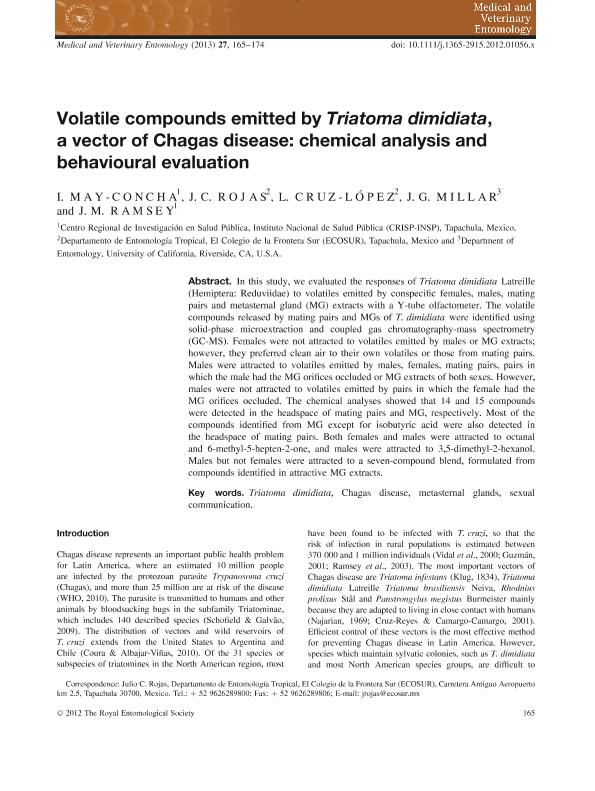Mostrar el registro sencillo del ítem
dc.contributor.author
May Concha, Irving Jesus

dc.contributor.author
Rojas, J. C.
dc.contributor.author
Cruz López, L.
dc.contributor.author
Millar, J. G.
dc.contributor.author
Ramsey, J. M.
dc.date.available
2018-02-22T14:14:56Z
dc.date.issued
2013-06
dc.identifier.citation
May Concha, Irving Jesus; Rojas, J. C.; Cruz López, L.; Millar, J. G.; Ramsey, J. M.; Volatile compounds emitted by Triatoma dimidiata, a vector of Chagas disease: Chemical analysis and behavioural evaluation; Wiley Blackwell Publishing, Inc; Medical and Veterinary Entomology; 27; 2; 6-2013; 165-174
dc.identifier.issn
0269-283X
dc.identifier.uri
http://hdl.handle.net/11336/36953
dc.description.abstract
In this study, we evaluated the responses of Triatoma dimidiata Latreille (Hemiptera: Reduviidae) to volatiles emitted by conspecific females, males, mating pairs and metasternal gland (MG) extracts with a Y-tube olfactometer. The volatile compounds released by mating pairs and MGs of T. dimidiata were identified using solid-phase microextraction and coupled gas chromatography-mass spectrometry (GC-MS). Females were not attracted to volatiles emitted by males or MG extracts; however, they preferred clean air to their own volatiles or those from mating pairs. Males were attracted to volatiles emitted by males, females, mating pairs, pairs in which the male had the MG orifices occluded or MG extracts of both sexes. However, males were not attracted to volatiles emitted by pairs in which the female had the MG orifices occluded. The chemical analyses showed that 14 and 15 compounds were detected in the headspace of mating pairs and MG, respectively. Most of the compounds identified from MG except for isobutyric acid were also detected in the headspace of mating pairs. Both females and males were attracted to octanal and 6-methyl-5-hepten-2-one, and males were attracted to 3,5-dimethyl-2-hexanol. Males but not females were attracted to a seven-compound blend, formulated from compounds identified in attractive MG extracts.
dc.format
application/pdf
dc.language.iso
eng
dc.publisher
Wiley Blackwell Publishing, Inc

dc.rights
info:eu-repo/semantics/openAccess
dc.rights.uri
https://creativecommons.org/licenses/by-nc-sa/2.5/ar/
dc.subject
Chagas Disease
dc.subject
Metasternal Glands
dc.subject
Sexual Communication
dc.subject
Triatoma Dimidiata
dc.subject.classification
Otras Ciencias Biológicas

dc.subject.classification
Ciencias Biológicas

dc.subject.classification
CIENCIAS NATURALES Y EXACTAS

dc.title
Volatile compounds emitted by Triatoma dimidiata, a vector of Chagas disease: Chemical analysis and behavioural evaluation
dc.type
info:eu-repo/semantics/article
dc.type
info:ar-repo/semantics/artículo
dc.type
info:eu-repo/semantics/publishedVersion
dc.date.updated
2018-02-21T21:07:23Z
dc.journal.volume
27
dc.journal.number
2
dc.journal.pagination
165-174
dc.journal.pais
Reino Unido

dc.journal.ciudad
Londres
dc.description.fil
Fil: May Concha, Irving Jesus. Instituto Nacional de Salud Publica; México. Provincia de Entre Ríos. Centro de Investigaciones Científicas y Transferencia de Tecnología a la Producción. Universidad Autónoma de Entre Ríos. Centro de Investigaciones Científicas y Transferencia de Tecnología a la Producción. Consejo Nacional de Investigaciones Científicas y Técnicas. Centro Científico Tecnológico Conicet - Santa Fe. Centro de Investigaciones Científicas y Transferencia de Tecnología a la Producción; Argentina
dc.description.fil
Fil: Rojas, J. C.. El Colegio de la Frontera Sur; México
dc.description.fil
Fil: Cruz López, L.. El Colegio de la Frontera Sur; México
dc.description.fil
Fil: Millar, J. G.. University of California; Estados Unidos
dc.description.fil
Fil: Ramsey, J. M.. Instituto Nacional de Salud Publica; México
dc.journal.title
Medical and Veterinary Entomology

dc.relation.alternativeid
info:eu-repo/semantics/altIdentifier/doi/http://dx.doi.org/10.1111/j.1365-2915.2012.01056.x
dc.relation.alternativeid
info:eu-repo/semantics/altIdentifier/url/http://onlinelibrary.wiley.com/doi/10.1111/j.1365-2915.2012.01056.x/abstract
Archivos asociados
